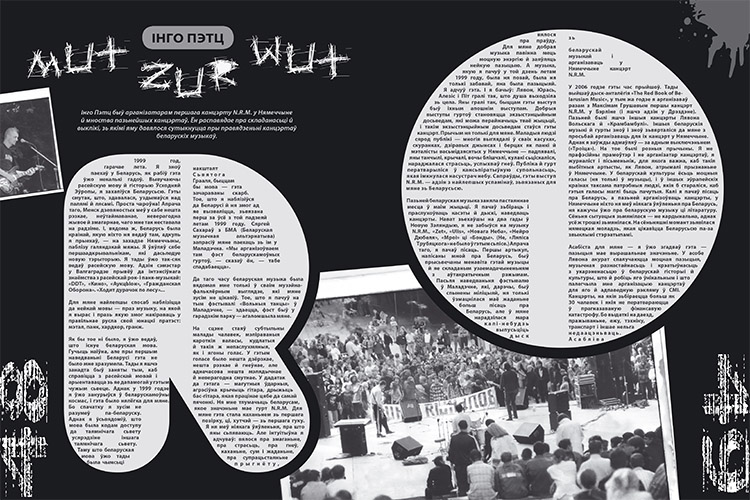
Аўтар: Ingo Petz, 02/09/2016 | event MUSIC
MUT ZUR WUT
pARTisan 31’2016
Ingo Petz organized the first concert of «N.R.M.» in Germany as well as numerous other shows. He speaks about the difficulties and challenges he had to meet when arranging the Belarusian musicians’ performances.
The hot summer of 1999. Once again I came to Belarus, one more visit in the course of several others in previous years. When studying Russian language and history of Eastern Europe, I got interested in Belarus. That sadness which seemed to be rising over its fields and forests. It was just charming! Besides, in the 1990s Minsk had some dramatic spirit, some freedom, it was incredibly alive and rebellious — I lacked all these in Germany then. And certainly in my own country, in Western Germany, close to the Dutch border nobody knew about Belarus. I saw myself as a pioneer exploring a new territory. I could somehow express myself in Russian, one semester of studies in Volgograd brought me to intensive contact with the Russian rock and punk music scene: «DDT», «Кino», «AukzYon», «Grazhdanskaya Oborona», «Khodit durachjok po lesu»…
For me the best way to get closer to a foreign language was to approach the music I was brought up myself on and through which I could adequately channel my youth protest: metal, punk, hardcore, grunge.
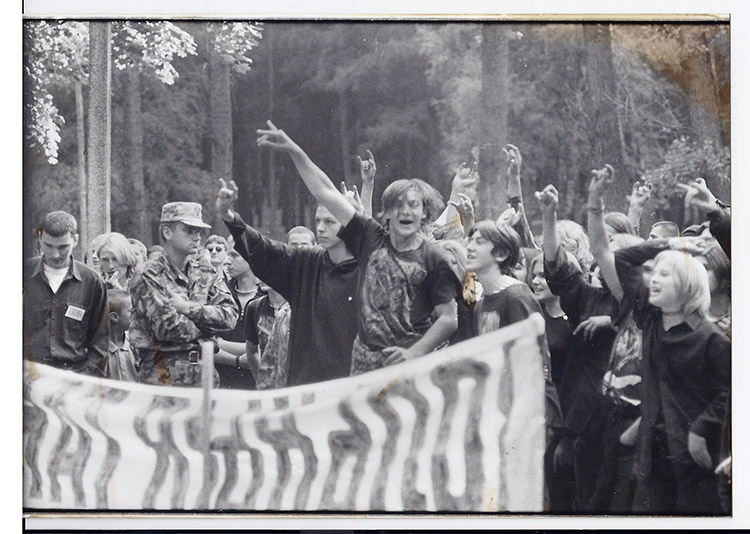
Volnyja tancy festival (BMA), Maladzečna, 1999. Photo by Ingo Petz
In any case, I already knew that the Belarusian language existed. It may sound naive, but during my first visit to Belarus it was not so clear to me at all. Then I was still struggling with the Russian language trying to use it in finding my way in the world which was foreign and strange to me. However, in 1999, I already immersed into the Belarusian universe, and it was not that easy. Since first I did not understand Belarusian at all. However, I realized that the language was an access code to the mysterious world inside another mysterious world. Because the Belarusian language already then was something like a Holy Grail, something like a language as an enchanted treasure. The fact that I approached Belarus and could not get rid of it was first of all linked to the event that occured in the summer of 1999. Siarhiej Sacharaŭ from «BMA» (Belarusian music alternative) invited me to come with him to Maładečna. «We are organizing the festival of Belarusian-speaking bands there, — he said, — you’ll like it.»
By that time I had known about the Belarusian music only as of a museum-folk variant which had absolutely no interest to me. What I heard at the festival «Free Dances» in Maładečna, — it seems that the festival was held in a city park — really left me shocked.
A slender young man was standing on the stage, he had short highlighted hair, disheveled and somewhat naughty, just like his voice. That voice was daring, sharp and angry, but at the same time — sweet and incredibly melancholic. In addition to this — powerful drums, an aggressively shouting guitar, a trembling bass, which seemed to be putting lightning in your bones. Well, it is not my job to explain the Belarusians how important the band «N.R.M.» was. For me it was love at first sight, or rather — at first sound. I had no idea what they were singing about. But intuitively I felt that it was about struggle, passion, anger, love, sadness and desire, about the oppression of the opposition, about the truth. For me, any good music should have a strong energy and declare a certain standpoint. And the music which I heard on that day in the summer of 1999, was far from being only expressive, it was not only entertaining, it really produced a clear standpoint. And I could feel it.
I clearly saw: Lavon, Juraś, Alezis and Pit were playing as if their souls were leaving their bodies. They were playing as if it was their last show. Bands’ good performances become existential experience that have the power to change your life, and it was that concert which actually provided me with such an existential experience. And not just me alone. Many young people among the public dressed in black leather jackets, holey jeans and ankle boots looked like German punks and metalheads from the 1980s were singing, dancing and shouting. Their eyes were sparkling, fists clenching, passion was born, anger was flaring. The crowd and the band turned into a conspiratorial community, aiming to reach the sky. Indeed, that concert of «N.R.M.»’s is still one of my best memories associated with Belarus.
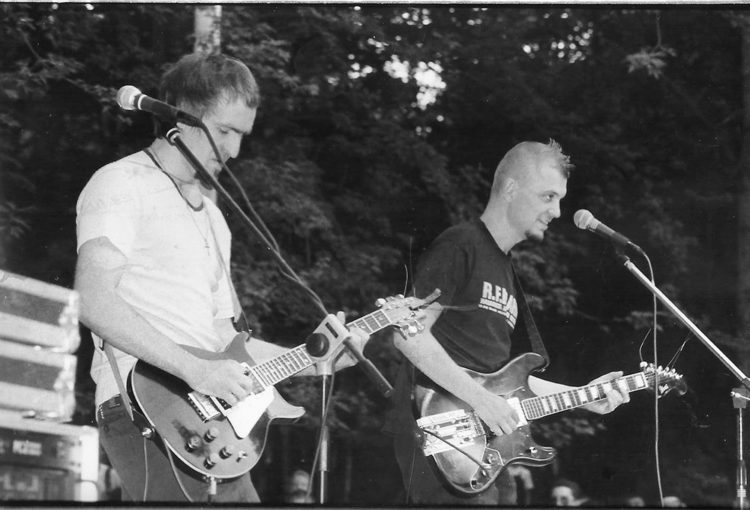
Pit Paulau and Lavon Volski. Volnyja tancy festival (BMA), Maladzečna, 1999. Photo by Ingo Petz
Later, the Belarusian music took a permanent place in my life. I started collecting and listening to tapes and CDs, attended concerts. Even having left for New Zealand for two years, I did not forget about the music of «N.R.M.», «Zet», «Ulis», «Novae Neba», «Neuro Dubel», «Mroja» or «Bonda». (No, «Liapis Trubetskoy» was not on the list). Moreover, I started writing. My first article, written about Belarus, was dedicated to that very music and its complex relationship with the autocratic regime. After a visit to the festival in Maładečna, which by the way was interrupted by the police, not only did raise my desire to write more about Belarus, but also a dream was born about releasing a CD with Belarusian music and organising a concert of «N.R.M.» in Germany
In 2006 this very moment came. The anthology «The Red Book of Belarusian Music» was released then, and in the same year together with Maksim Hrušavy I organized «N.R.M.»’s first concert in Berlin (and another one — in Dresden). Later there were Lavon Volski´s solo concerts and «Krambambulya»’s gigs. Different Belarusian musicians and groups were constantly asking me to arrange their concerts in Germany. I always refused — with one exception («Troitsa»). The reasons for my refusal were various. I am not a professional promoter and organizer of concerts, I was a journalist and a writer, and for me it was important to make such outstanding artists as Lavon recognized in Germany. Belarusian culture has strong voices (and not only in music), and in other European countries people are also needed who would do their best to make these voices heard. When I began writing about Belarus, and later to organize concerts, in Germany no one had any idea about Belarus, not to mention the non-existing knowledge about Belarusian music or literature.
Nowadays the situation has changed — not dramatically, but still it is different. Today in Germany you can find younger people who are interested in Belarus beyond familiar stereotypes.
I have already made it clear — it is the attitude that has a critical meaning which drives my interest in music. In Lavon’s personality I saw the combination of a strong attitude, a musical diversity and creativity rooted in the Belarusian history and culture, which makes him unique and which made it easier for me to organize his concerts and make adequate advertising in the mass media. I could arrange the concerts that attracted more than 30 people and did not become a planned financial catastrophe. Since after all, you should not underestimate travel, accommodation, food, equipment, transport and other types of expenses. «Krambambulya»’s concerts have always worked out really pretty well. This music is good for both dancing and hanging out, and at the same time understanding the lyrics is not as crucial for getting into «Krambambulya»’s vibes. This factor cannot be overlooked when trying to predict the probability of the concert’s success. Just because the Germans do not understand the Belarusian language. And to have a club somehow filled in you definetely need the German public.
Basically, I talk exclusively about Berlin as a potential place for performances. Under certain conditions it might also be Hamburg. However, in almost all other major German cities Belarusian musicians would face difficulties as the interest in Eastern Europe is quite low. Whereas in Berlin there are young Germans who are genuinely interested in Eastern Europe and Belarus. There is also a relatively large Belarusian diaspora (who is interested in Belarusian culture), but at the same time you can not value them as a market factor, as the diaspora alone would not be enough to fill in a club with more than 60 people. When Lavon plays a solo concert, I can not count on the Germans, because they do not understand Belarusian. The question about the payment that would satisfy musicians, the concert organizer and the local concert operator was not even raised on a due level. But Berlin also has significant drawbacks. There are hundreds of clubs and stages where musicians and bands can perform, but the payment or box office share, to put it mildly, is very low. In Berlin, however, the public is very open, international and relatively biased, also being interested in exotic music. But, hundreds of concerts take place every night in the capital, so it is really very difficult to get the potential audience involved. This means that you need to invest a lot of time in concert advertisement. And who wants to do it for free?
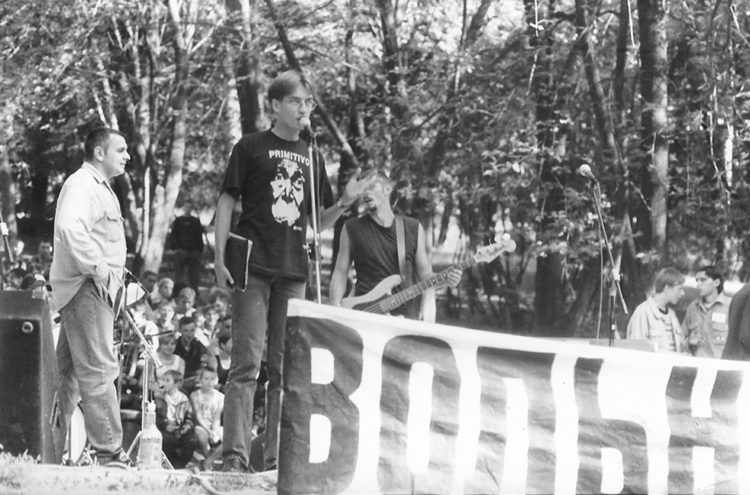
Volnyja tancy festival (BMA), Maladzečna, 1999. Photo by Ingo Petz
As a rule, it only means to carry out intensive work in educating and investing, performing from year to year and hoping that once you will succeed to produce a mini-breakthrough (which is not guaranteed at all). And this, in turn, stands for loads of work, tons of energy, readiness to face frustration, defeat and above all — no financial rewards. All these factors were the reasons why I repeatedly refused to organize concerts for other bands and musicians. The effort and troubles were too great, and the risk of failing was too high. This does not mean that a Belarusian band could not at all succeed in somehow filling in a small Berlin club. If you think that you can, just try it, do it and nothing should stop you! And a little piece of advice: learn German or at least English to communicate with the audience.
Perhaps my view of the Belarusian music is very specific. But I never again had a chance to fall in love with some other band so passionately as it happened with «N.R.M.» — which, of course, happened due to personal factors. Projects like «N.R.M.» and «Krambambulya» had also the advantage of being far superior to the groups who just sing their songs and imagine being rock stars. They also had a clear, but subversive legend, brought about due to the social and political situation in Belarus: «N.R.M.» — as a conspiratorial state within a state, where only your dreams and your freedom are real. «Krambambulya» — as a band that stays away from the grotesque rules of real Belarus through its own fantasy and ideas, as well as through the freedom of humour. It is these things that allow us to understand that Lavon´s music should in cetain respects actually being regarded as conceptional art. Such legends and narratives (which, of course, grew out of the Belarusian context) were extremely important to enable us to attract journalists’ and the Germany media attention before the concerts. The more interesting the story of musicians and the band is, the deeper is its artistic core, the more rooted it is in Belarus, the better it is «for sale» and the greater is the chance of a good concert attendance. The high quality of the music is not enough at all. Since there are ten thousand bands that perform music that can be called good or not bad.
Many Belarusian groups that appeared in the last ten years do not tell me such stories. Sorry for the generalization, but for me they are simply too decent and obedient (I do not mean necessarily the political sense, rather — the sense of a fighter’s attitude towards life). I am aware of the difficult situation in which bands and musicians try to survive in Belarus. But my tastes as those of a supporter of subcultures and non-conformism, in which I see the decisive force for the revitalization of the music scene, are hardly satisfied now.
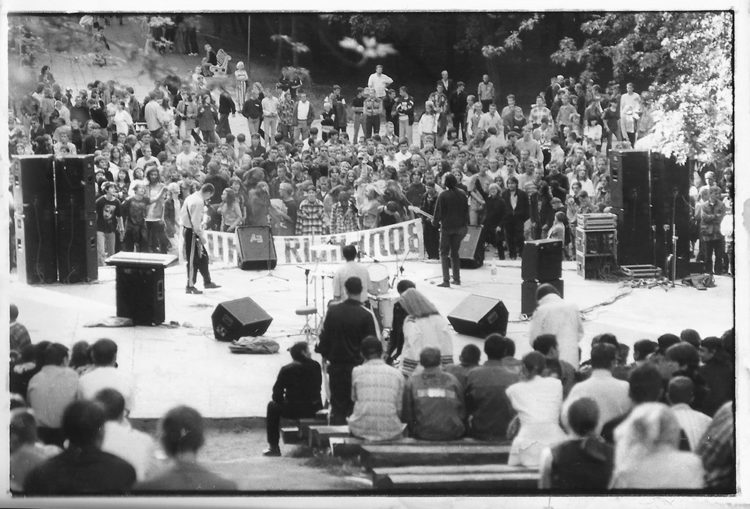
Volnyja tancy festival (BMA), Maladzečna, 1999. Photo by Ingo Petz
The band, in which I can trace quite good prospects is «TonqiXod» (the mere name of this band deserves a separate cultural-anthropological essay!). Indeed, I would be happy to organize in Germany a couple of concerts of this band, which I believe to be very promising due to the combination of meaningful texts and gruff, willful and obstinate music. However, the idea of organizing a band’s concert is just an idealistic thought. Because to get even a vague idea of what «TonqiXod» is singing about, you need not only to know the Belarusian language, but also to understand the Belarusian cultural codes.
But do you really think it would be a good idea to distribute dictionaries and anthropological essays to the audience before such a show of rock music?
Ingo Petz. Translated by Volha Bubič.
Photos by Ingo Petz.
Opinions of authors do not always reflect the views of pARTisan. If you note any errors, please contact us right away.




